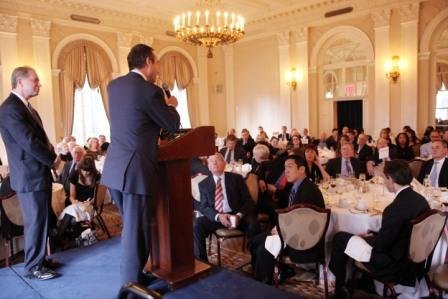2010 Scholarship Luncheon with Lionel Barber, Editor, Financial Times
February 19, 2010
by Aimee Vitrak
More than 220 guests attended this year's OPC Foundation Scholarship Luncheon and echoed the cause that foreign correspondents are needed now more than ever. With the help of an OPC scholarship, twelve aspiring news leaders have been given a chance to carry the torch.
The luncheon was held at the Yale Club in Midtown Manhattan on Friday, February 19. At the event, the Foundation awarded $24,000 in scholarships to 12 graduate and undergraduate students aspiring to become foreign correspondents. The scholarship recipients who emerged from an incredibly competitive field of 200 applications from more than 63 colleges are from Columbia University, CUNY Graduate School of Journalism, New York University, Northwestern University, Ryerson University (Toronto), Stanford University and the University of California-Santa Barbara.
Jenny Gross, a graduate student at Northwestern University and this year's David R. Schweisberg Memorial Scholarship recipient, thanked the OPC for the scholarship and said that winning has given her confidence to pursue her dream of becoming a foreign correspondent.
"I don't like danger and deprevation," joked Jeff Roberts, the Reuters Scholarship recipient, who will intern with Reuters in Paris. "My essay for the OPC scholarship was on bagles, specifically Montreal bagels. I'm interested in the geographical and intellectual property for foods."
When bestowing the Harper's Magazine Scholarship in memory of I.F. Stone to Owen Kibenge, a graduate student at Columbia University School of Journalism, John R. MacArthur said, "I.F. Stone would have supported paywalls," in reference to the current Internet model where news is "free." Again and again throughout the luncheon, people questioned the ability to get people to pay for news and for paying journalists and media companies who write and distribute the news.
The keynote speaker, Lionel Barber, editor of The Financial Times, answered the question with no hestitation: "The Financial Times doesn't have a problem asking readers to pay for news." The FT has 100 reporters on the ground around the globe. "But this is no time to gloat," Barber continued. He attributed the downfall of the American newspaper business as lacking competition, that papers didn't innovate, were slow to see the threat of the Internet and didn't adapt in time.
"Journalists in England, we do like to occasionally tipple, but we innovate," he said, mentioning the tabloid-size design of many British newspapers and shorter stories that do not jump. To resolve economic problems at the FT, he cut 25% of the staff in production and put those resources into reporting and content.
"If newspapers move into a loss, they don't invest in technology or talent and this makes a huge difference that's key to have the ability to change," he said. "To recognize the threat and understand what your audience wants."
OPC Foundation President Bill Holstein asked how Barber pushed through budget changes to the coporate owners of the FT, Pearsons, and Barber quipped, "Charm." Then went on to answer the question by saying, "When a proprietor believes in foreign reporting, budget talks are much easier... . [To Pearsons, the FT] is accountable and expected to be profitable. Some others in the news business are willing to take a loss to have a top table in London."
Barber said the FT newsroom has a full web-paper integration and that journalists there are expected to create stories in all formats: print, web, video, etc.
OPC President Allan Dodds Frank asked Barber to comment on the state of "news aggregators" like Huffingtonpost.com, a site that links to stories with its website fonts and colors, passing it off to readers as its own content yet providing a direct link to that media company's story. Google News does this as well, among many other websites.
Barber replied, "Yes, aggregators lead people to stories, but we believe our content has value. We're not in for 'reach's sake.' We are for people who are prepared to pay for content."
Readers who log on to FT.com, can read one story for free a month without registering. Registered users can read up to 10 stories with no fee each month. Then there are elevated levels of access for a fee. This is a similiar pay model nytimes.com has declared it will move to in 2011.
The current economic crisis, Barber said in his speech, is a boon for recent j-school graduates: "there hasn't a better time to be a financial journalist since the great crash."


